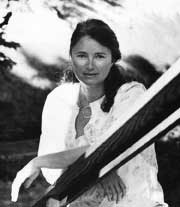 Women are not yet on equal footing with men politically, financially, or culturally. If you have a pulse and a sense of right and wrong, there is a moral imperative to do something about this, particularly if you actually have a vagina. I identify that imperative as feminism.
Women are not yet on equal footing with men politically, financially, or culturally. If you have a pulse and a sense of right and wrong, there is a moral imperative to do something about this, particularly if you actually have a vagina. I identify that imperative as feminism.
Feminism came to me from both parents, more obviously from my housewife mother, who longed to have been something other than a housewife, but also from my father, who viewed his young daughters as, if anything, more capable than boys (possibly to the detriment of his sons). As my sister was getting married at 22, he begged her not to put her artistic career on hold in favor of domestic life. “Your mother was typing my thesis when she should have been writing her own,” he told her.
The presence of feminism in my life has been persistent but steadily evolving. There was the usual collegiate focus on reproductive rights, then a new professional’s dawning recognition of how much sexism remained in the work place, a young woman’s hopes for equal footing in romantic relationships and eventually a mother’s concern for division of labor within the rubric of parenting. But at this moment in time, as a woman working in the field of film criticism, my feminism is most focused on the need for women’s voices to be represented equally in media. And at mid-career, feminism feels like the boulder I’m happy to see on a long hike, the one I can lean against while I catch my breath and then push off from to move onward.
Notwithstanding the late Pauline Kael and today’s exciting and inspiring female staff critics at EW (Lisa Schwarzbaum), The New York Times (Manohla Dargis), and Slate (Dana Stevens), film criticism is still a male-dominated profession. Within my decade-plus on the job, I’ve encountered sexism on every level, institutional and external. There are knee-jerk responses on all fronts as to what one’s interests are and what one’s capacity to relate to a film may be. There’s also the reality of the lesser role women play in Hollywood; fewer movies are made with women in mind, drastically fewer movies are made by women, and getting on screen still often means playing the girlfriend.
The issue of limited opportunities to be heard isn’t something that can be written off as a product of a shallow form of media where the physical is nearly everything. In 2010, VIDA started tracking the publication statistics for the numbers of women writing for and being written about in a select group of major newspapers and magazines, with a focus on book reviews, which I also write. Their results were a revelation; what had seemed intuitively to be not entirely an equal playing field was a situation of chronic disparity. It was a pie in the face.
Those VIDA numbers, which barely budged in 2011, have made me more aggressive as a freelancer. Although I write most regularly for Time, I have to pitch other publications. (Time is not on VIDA’s watch list, although my hunch is, if it were, it would display more gender parity in terms of bylines than offenders such as The Nation, The Atlantic or The Times Literary Supplement, although I have been told I was the first female movie critic to write for the magazine.) So I very deliberately started pitching one of the VIDA offenders.
The visibility would be good for me even if all things were equal, but I was also bolstered by indignation; I’d placed so much faith in so many of the publications on VIDA’s list and suddenly there was this evidence that they put less faith in people of my sex. Some have suggested women are part of the problem because we are not bold enough in pursuing the pitch. Fine, I’ll be bold. Pesky if need be; I’m 18 months into my steady stream of pitches and fruitless so far. Do you think I’ll stop? Not with the boulder behind me. Feminism has my back.
——
About the author: Journalist Mary Pols is the author of Accidentally on Purpose: The True Tale of a Happy Single Mother (Ecco/Harper Collins, 2008). Her film reviews and commentary can be found weekly on Time.com and occasionally in the magazine, along with book reviews. Prior to working for Time, Pols was the movie critic for the Contra Costa Times. Pols has written for The New York Times, Self, Wondertime, MoreIntelligentLife.com, Glamour.com, the Times of London, The San Francisco Chronicle, Red Magazine, Parenting and Grazia.
Republished with permission from The Virginia Quarterly Review







